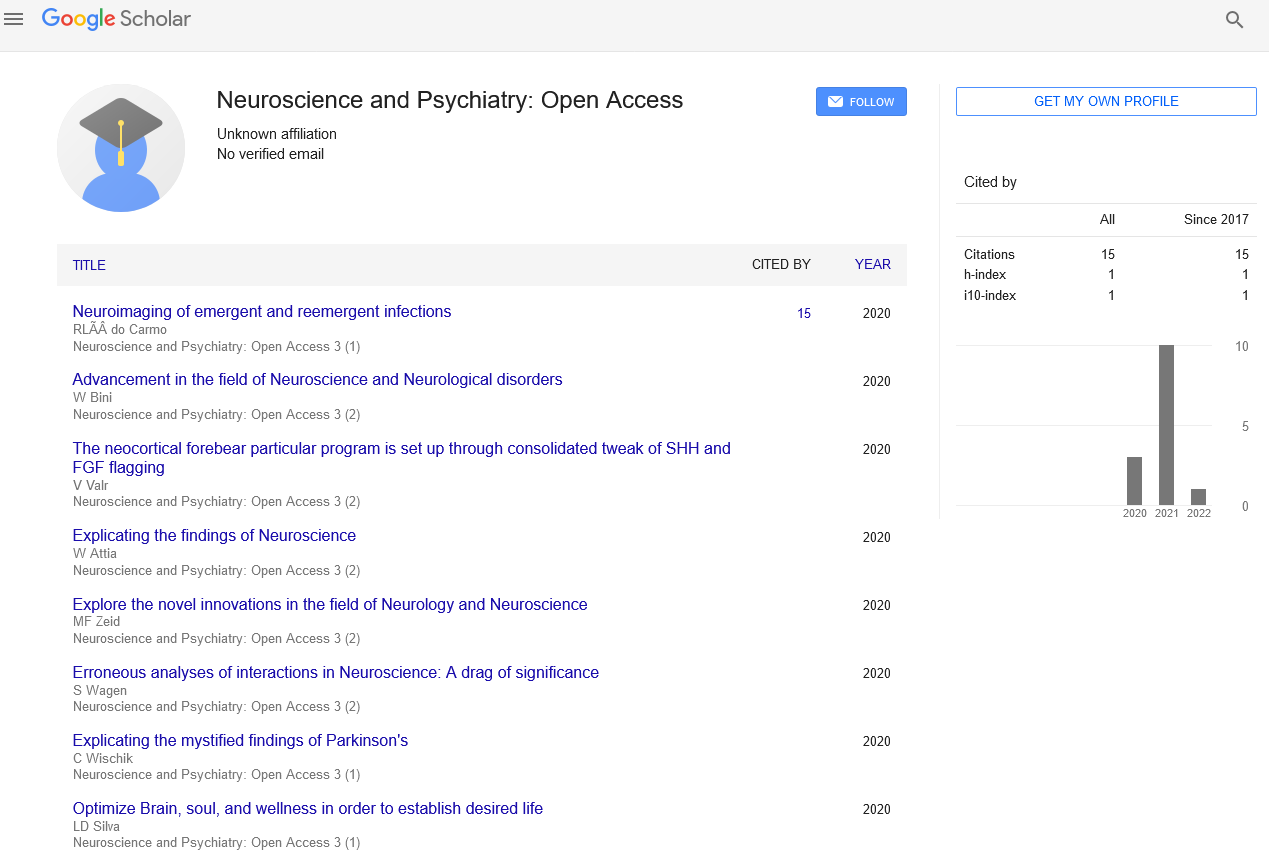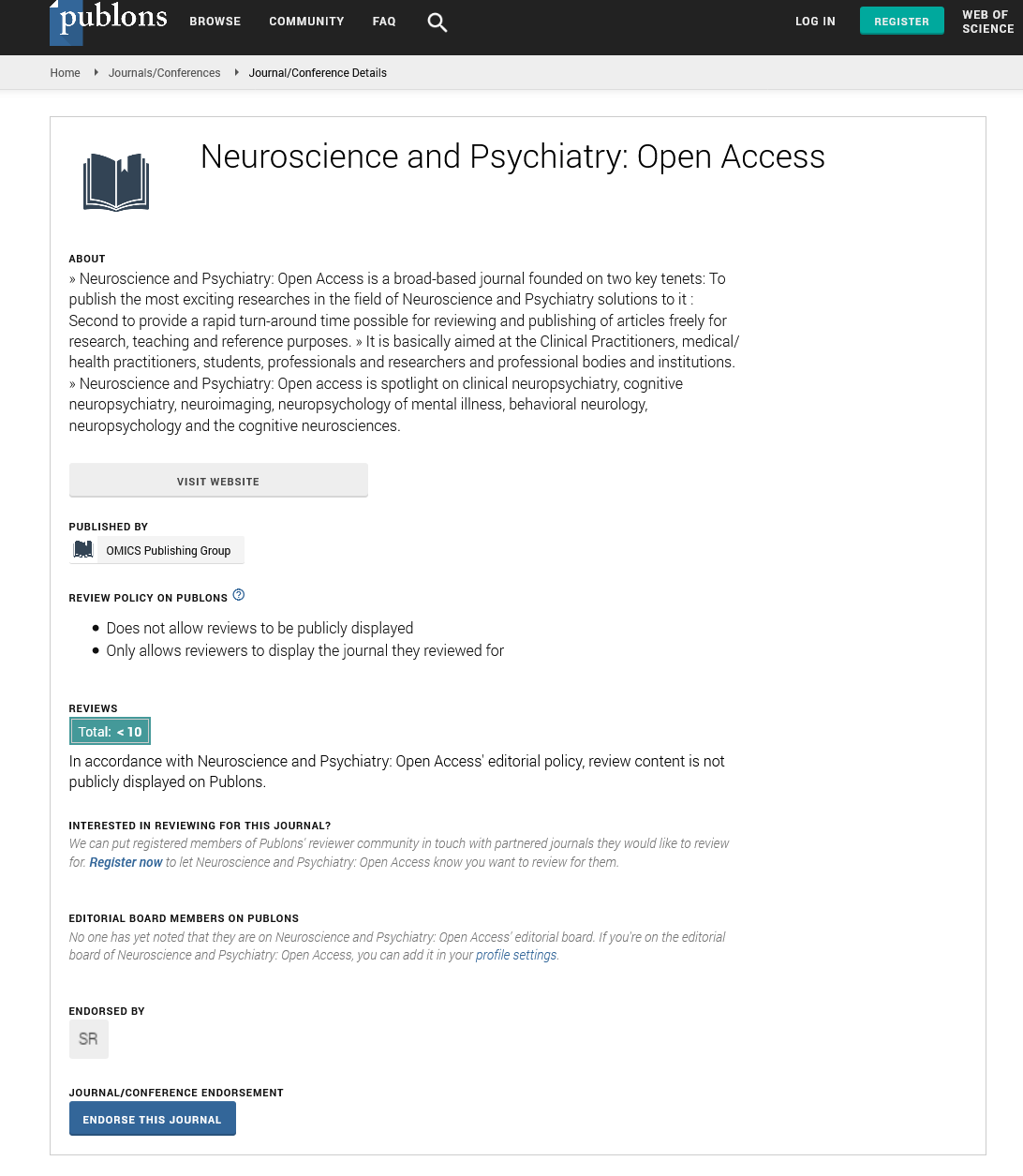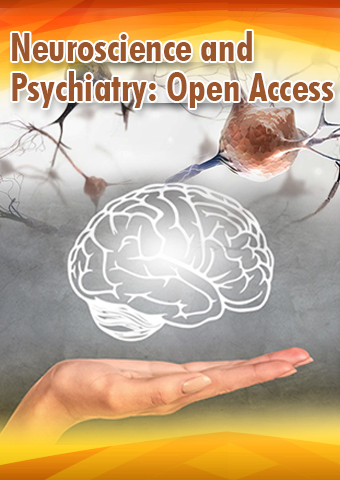Perspective - Neuroscience and Psychiatry: Open Access (2024) Volume 7, Issue 3
Enhancing Well-being in Later Life: The Role of Geriatric Psychiatry
- Corresponding Author:
- Carrie Bearden
Department of Psychiatry and Neurobehavioral Sciences, University of Virginia, Charlottesville, USA
E-mail: Cbeard56e@mednet.ucla.edu
Received: 06-04-2024, Manuscript No. NPOA-24-128824; Editor assigned: 09-04-2024, PreQC No. NPOA-24-128824 (PQ); Reviewed: 23-04-2024, QC No. NPOA-24-128824; Revised: 03-05-2024, Manuscript No. NPOA-24-128824 (R); Published: 10-05-2024, DOI: 10.47532/npoa.2024.7(3).205-207
Introduction
Geriatric psychiatry, also known as geropsychiatry or psychogeriatrics, is a specialized field of medicine dedicated to the mental health care of older adults. As the global population ages, the demand for geriatric psychiatric services continues to grow, driven by the unique mental health needs and challenges faced by older individuals. From late-life depression and dementia to anxiety disorders and substance use disorders, geriatric psychiatry addresses a broad spectrum of mental health conditions affecting older adults. In this article, we explore the principles, practices, and innovations in geriatric psychiatry aimed at promoting mental well-being and quality of life in later life.
Description
Understanding the unique mental health needs of older adults
Older adults experience a myriad of changes and transitions that can impact their mental health and well-being. Key factors influencing mental health in later life include:
• Aging-related changes: Normal aging is associated with physiological, cognitive, and
psychosocial changes that can influence mental health. Common age-related changes include
declines in sensory perception, memory, processing speed, and executive function, as well
as alterations in sleep patterns, appetite, and energy levels. These changes may contribute to
increased vulnerability to mental health problems and challenges in coping with stressors
and life transitions.
• Chronic health conditions: Older adults often contend with multiple chronic health
conditions, such as cardiovascular disease, diabetes, arthritis, and neurodegenerative
disorders like Alzheimer’s disease and Parkinson’s disease. Chronic illness can exacerbate
symptoms of depression, anxiety, and other mental health conditions and complicate
treatment and management strategies. Addressing the mental health needs of older adults
requires a holistic approach that considers the interplay between physical health, mental
well-being, and functional status.
• Psychosocial stressors: Older adults may face a range of psychosocial stressors that impact
their mental health, including bereavement, social isolation, caregiving responsibilities,
financial strain, and changes in living arrangements. Losses associated with aging, such as the
loss of independence, mobility, and social roles, can precipitate feelings of grief, loneliness,
and existential distress. Psychosocial interventions that address social support, coping skills,
and life transitions are integral to promoting resilience and mental well-being in later life.
• Stigma and barriers to care: Stigma surrounding mental illness and ageism can deter
older adults from seeking help for mental health concerns and accessing appropriate care.
Cultural beliefs, generational attitudes, and misconceptions about aging and mental health
may contribute to under recognition and under treatment of mental health problems in
older adults. Overcoming stigma and addressing barriers to care require a concerted effort to promote mental health literacy, reduce
discrimination, and enhance access to
culturally competent and age appropriate
mental health services.
Principles and practices of geriatric psychiatry
Geriatric psychiatry emphasizes a patient centered, interdisciplinary approach to the assessment, diagnosis, and treatment of mental health conditions in older adults. Key principles and practices include:
• Comprehensive assessment: Geriatric
psychiatry assessments encompass a
thorough evaluation of medical, psychiatric,
cognitive, and psychosocial factors that may
contribute to or impact the individual’s
mental health. Assessment tools commonly
used in geriatric psychiatry include cognitive
screening measures (e.g., mini-mental state
examination), depression and anxiety scales,
functional assessments (e.g., activities of
daily living), and geriatric depression scales.
The comprehensive assessment informs
diagnostic formulation, treatment planning,
and monitoring of treatment response over
time.
• Multimodal treatment approaches: Treatment in geriatric psychiatry often
involves a multimodal approach that
integrates pharmacotherapy, psychotherapy,
behavioral interventions, and psychosocial
support. Pharmacotherapy may include
antidepressants, anxiolytics, antipsychotics,
mood stabilizers, and cognitive enhancers,
tailored to the individual’s specific diagnosis,
symptoms, and medical comorbidities.
Psychotherapeutic approaches, such as
Cognitive-Behavioral Therapy (CBT),
supportive therapy, reminiscence therapy,
and problem-solving therapy, address
cognitive, emotional, and interpersonal
issues and promote coping skills and
resilience.
• Care coordination and collaboration: Geriatric psychiatry emphasizes collaboration
among multidisciplinary team members,
including psychiatrists, primary care
providers, psychologists, social workers,
nurses, occupational therapists, and other
allied health professionals. Care coordination
ensures continuity of care, facilitates
communication and information sharing,
and addresses the complex needs of older
adults across medical, psychiatric, and social
domains. Interdisciplinary team meetings,
case conferences, and care coordination
protocols optimize treatment outcomes and
enhance the quality of care provided to older
adults.
• Family and caregiver support: Family
members and caregivers play a vital role
in the care and support of older adults
with mental health conditions. Geriatric
psychiatry involves educating and engaging
families and caregivers in treatment
planning, providing psychoeducation
about the individual’s condition, treatment
options, and caregiving strategies, and
offering support and resources to address
caregiver burden and stress. Family therapy,
caregiver support groups, and respite
care services help caregivers cope with the
challenges of caring for a loved one with
mental illness and promote their well-being.
Innovations in geriatric psychiatry
Advances in geriatric psychiatry have led to innovations in assessment, treatment, and delivery of care for older adults. Key innovations include:
• Telepsychiatry and telehealth: Telepsychiatry
and telehealth platforms offer remote access
to psychiatric evaluations, consultations,
psychotherapy, and medication
management for older adults who may
have limited mobility, transportation
barriers, or reside in rural or underserved
areas. Telepsychiatry expands access to
geriatric mental health services, enhances
convenience and flexibility in care delivery,
and reduces stigma associated with seeking
help for mental health concerns.
• Collaborative care models: Collaborative
care models integrate mental health services
into primary care settings, facilitating early
detection, intervention, and management
of mental health conditions in older adults.
Collaborative care teams consist of primary
care providers, psychiatrists, care managers,
and other health professionals who work
together to deliver integrated, evidence-based care that addresses the holistic needs
of older adults across physical and mental
health domains. Collaborative care models
improve access to mental health services,
enhance treatment adherence, and optimize
health outcomes for older adults with
mental illness.
• Technology-based interventions: Technology-based interventions, such as
smartphone apps, wearable devices, and
virtual reality platforms, offer innovative
tools for monitoring, managing, and
treating mental health conditions in older
adults. Digital mental health interventions
may include cognitive training programs,
mindfulness-based apps, self-management
tools, and virtual reality therapies for
anxiety and phobias. Technology-based
interventions enhance engagement,
accessibility, and scalability of mental health
services, empowering older adults to take an
active role in managing their mental health
and well-being.
• Precision medicine and personalized care: Precision medicine approaches in geriatric
psychiatry aim to tailor treatment strategies
to the individual characteristics and needs of
older adults, taking into account factors such
as genetics, biomarkers, pharmacogenomics,
and psychosocial determinants of health.
Personalized care plans consider the
individual’s unique preferences, values,
cultural background, and treatment
goals, optimizing treatment outcomes
and enhancing patient satisfaction and
adherence. Precision medicine approaches
hold promise for optimizing medication
selection, dosing, and monitoring in older
adults with mental health conditions,
minimizing adverse effects and maximizing
therapeutic benefit.
Conclusion
Geriatric psychiatry plays a vital role in addressing the mental health needs of older adults and promoting well-being and quality of life in later life. By adopting a biopsychosocial approach that considers the complex interplay of biological, psychological, and social factors, geriatric psychiatry offers comprehensive assessment, evidence-based interventions, and innovative approaches to care delivery for older adults with mental health conditions. As the field of geriatric psychiatry continues to evolve, embracing advances in technology, collaborative care models, and personalized medicine, it holds promise for enhancing the mental health and resilience of older adults and optimizing their quality of life in later years. With a commitment to compassionate, person-centered care, geriatric psychiatry continues to pave the way towards a future where aging is characterized by dignity, vitality, and emotional well-being for all.


